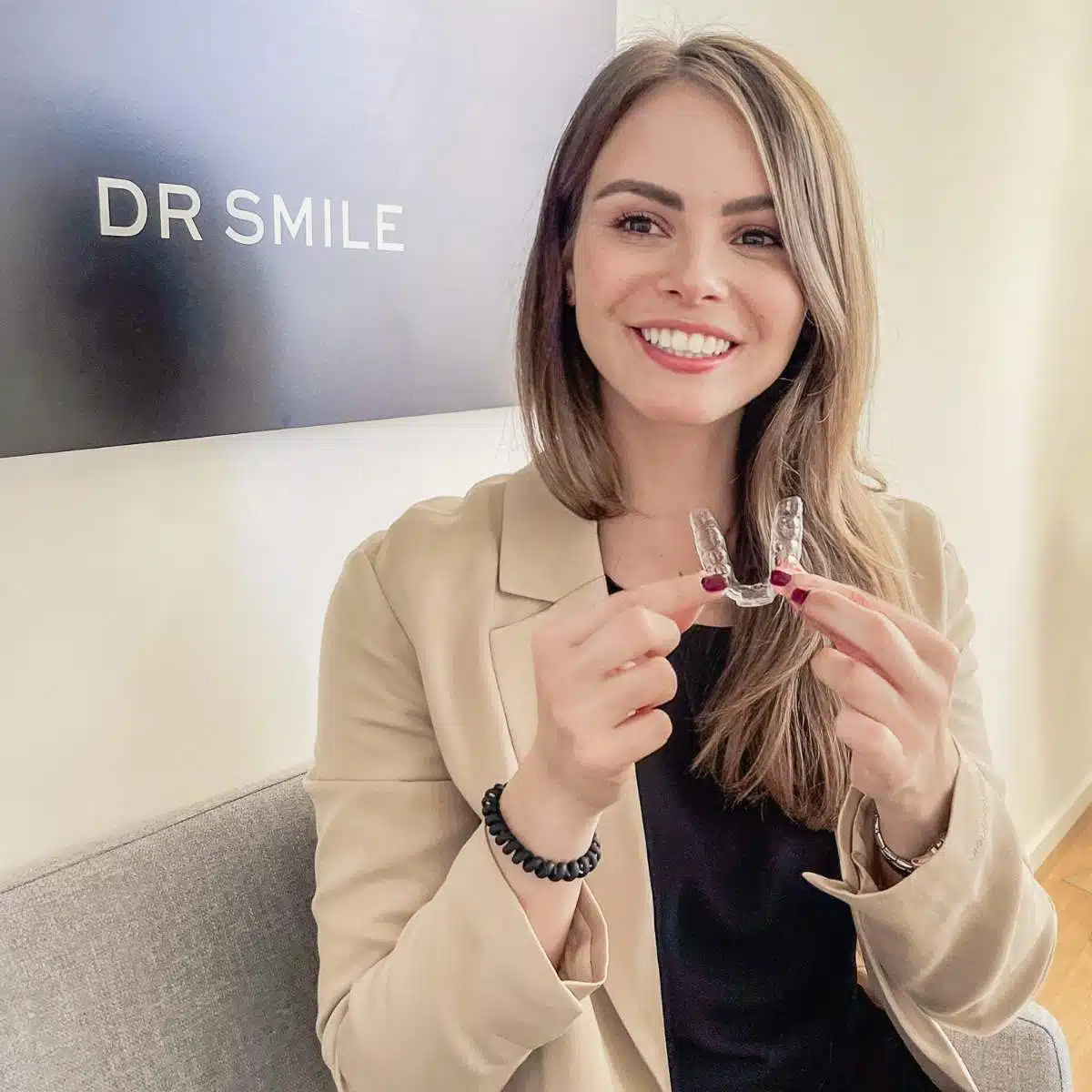Are you interested in dental treatment abroad? Find out here about the benefits, risks, possible countries and local standards.
Dental treatment abroad is becoming an attractive option for more and more people.
The prospect of considerable cost savings combined with high quality treatment attracts many patients abroad.
However, before you decide to have dental treatment abroad, you should carefully weigh up the pros and cons and obtain comprehensive information.
In this article, you’ll learn everything you need to know about dental treatment abroad: From the most popular countries and potential savings to the treatments on offer and the risks you should keep in mind.
| Get 150 € discount on your dental correction! |

Book a consultation appointment now at a nearby DrSmile partner practice and find out if teeth straightening with aligners is right for you.
The appointment is completely non-binding and does not involve any costs.
With the code “THATSMILE150” you will receive 150 € discount on the treatment.
Advantages of dental treatment abroad
1. cost savings: One of the main reasons why many people opt for dental treatment abroad is the often significantly lower costs. In many countries, the cost of living and therefore also the wage costs for dental staff are lower than in Germany, Austria or Switzerland. As a result, dentists and orthodontists can offer their services at a fraction of the local costs. Depending on the treatment, the savings can be up to 70%.
2. high treatment quality: In many countries, dentists have specialized in international patients and offer treatments at a high level. Many practices are certified according to international standards and use modern technologies and high-quality materials that are in no way inferior to the products used in Germany.
3. combined treatment and vacation: Dental treatment abroad can often be combined with a vacation. In popular destination countries, you can relax after treatment and explore the country. This combination is particularly suitable in countries with good infrastructure and tourist attractions.
4. shorter waiting times: In many countries, waiting times for dental treatment are shorter than in Germany. This means you can get an appointment faster and complete your treatment more quickly.

Disadvantages and risks of dental treatment abroad
1. language barriers: In some countries, there may be communication problems if the medical staff do not speak sufficient English or German. This can make communication difficult and cause misunderstandings during treatment.
2. fluctuations in quality: Although many clinics abroad offer high quality, there are also practices that do not work according to international standards. Without thorough research, there is a risk of ending up at a less qualified clinic.
3. aftercare and guarantee: Aftercare can be problematic if the treatment was carried out abroad. In the event of complications or adjustments, you may have to travel abroad again, which involves additional costs and time. Warranty claims are also more difficult to enforce.
4. travel and accommodation costs: Although treatment costs abroad are often cheaper, you should take into account the costs for travel, accommodation and meals. Depending on the destination country and length of stay, these can be considerable and reduce the savings.
Popular countries for dental treatment abroad
1 Hungary: Hungary is one of the most popular countries for dental treatment abroad. The country has earned an excellent reputation for high-quality dentistry at affordable prices. Budapest is a central point of contact for international patients.
2 Poland: Poland also offers high quality treatment at attractive prices. The country’s proximity to Germany makes it particularly interesting, as it is quick and inexpensive to travel to. Dentists in Poland are also often internationally trained and offer a comprehensive range of treatments.
3 Turkey: Turkey is another hotspot for dental treatment. Many clinics in Istanbul and Antalya specialize in international patients and offer Western-style treatments at significantly lower prices. Turkey is particularly well known for aesthetic dental treatments such as veneers and dental implants.
4. Spain: Spain, especially the regions around Barcelona and Madrid, is known for high-quality dental clinics that specialize in international patients. Many dentists in Spain have studied in Germany or other European countries and offer treatment at the highest level.
5 Thailand: Thailand is a popular destination for dental tourism, especially for patients from Australia and the USA. Treatments are significantly cheaper compared to Western countries, and clinics in Bangkok or Phuket offer modern facilities and well-trained professionals.

How high can the savings be?
The savings on dental treatment abroad can be considerable, ranging from 30% to 70% depending on the country and type of treatment. Here are some examples:
- Dental implants: In Germany, dental implants including crowns often cost between 2,000 and 3,000 euros. In Hungary or Turkey, the price can fall to between 800 and 1,500 euros.
- Veneers: The cost of veneers in Germany is between 700 and 1,500 euros per tooth. In countries such as Poland or Hungary, the costs can be reduced to between 300 and 800 euros.
- Dental crowns: Dental crowns cost between 600 and 1,200 euros in Germany. In Poland or Turkey, prices can fall to between 300 and 600 euros.
What dental treatments are offered abroad?
Almost all common dental treatments are offered abroad, including:
- Dental implants: For replacing missing teeth with artificial tooth roots.
- Dental crowns and bridges: For restoring damaged or missing teeth.
- Veneers: For aesthetic corrections such as covering discoloration or adjusting the shape of teeth.
- Teeth whitening: For gentle whitening of the teeth.
- Dental cleaning and prophylaxis: Regular cleanings and preventive measures to maintain dental health.
- Orthodontics: correction of misaligned teeth, often using modern techniques such as invisible aligners.

What should you look out for when undergoing dental treatment abroad?
1. thorough research: Before deciding on dental treatment abroad, you should research the clinic and dentist carefully. Read testimonials, check certifications and make sure that the clinic works according to international standards.
2. communication: Clarify in advance whether communication in English or German is possible without any problems. Clear communication is essential in order to convey your wishes and concerns correctly.
3. before and aftercare: Consider how the before and aftercare will be organized. Some clinics work with partner dentists in Germany who can provide aftercare. Be sure to clarify this before treatment.
4. insurance cover: Check whether your insurance covers costs abroad and whether additional insurance makes sense. International health insurance can be helpful in the event of problems abroad.
5. consider travel costs: Compare total costs, including travel and accommodation costs, to ensure that treatment abroad is really financially worthwhile.
Conclusion: Is dental treatment abroad worthwhile?
Dental treatment abroad can be an excellent way to receive high-quality dental services at a fraction of the cost that would be incurred in Germany.
With the right planning and research, you can benefit from considerable cost savings without compromising on quality.
It is important that you weigh up the potential risks and disadvantages and take all the necessary precautions to ensure successful and safe treatment.
This way you can not only save money, but perhaps also enjoy a nice vacation.
| Get 150 € discount on your dental correction! |

Book a consultation appointment now at a nearby DrSmile partner practice and find out if teeth straightening with aligners is right for you.
The appointment is completely non-binding and does not involve any costs.
With the code “THATSMILE150” you will receive 150 € discount on the treatment.
FAQs on dental treatment abroad
Here we answer a few of the most frequently asked questions about dental treatment abroad.
Why are more and more people opting for dental treatment abroad?
Many people opt for dental treatment abroad because the costs there are often significantly lower than in Germany.
At the same time, many clinics abroad offer a high quality of treatment that meets the standards in Western Europe.
The possibility of combining treatment with a vacation is another attractive factor.
In which countries are dental treatments abroad particularly popular?
Popular countries for dental treatment abroad are Hungary, Poland, Turkey, Spain and Thailand.
These countries have specialized in dental tourism and offer high-quality treatments at comparatively low prices.
How much can I save on dental treatment abroad?
Depending on the treatment and destination country, the savings can be between 30% and 70%.
For example, dental implants often cost 2,000 to 3,000 euros in Germany, while they are offered for 800 to 1,500 euros in Hungary or Turkey.
Is the quality of dental treatment abroad as good as in Germany?
In many cases, yes.
Countries such as Hungary, Poland and Turkey have built up a good reputation for high-quality dental treatment.
Many clinics have modern equipment and work with experienced dentists who are often internationally trained.
However, it is important to inform yourself thoroughly in advance and choose a reputable clinic.
What are the risks of dental treatment abroad?
Risks include possible language barriers, variations in quality between clinics and potential problems with aftercare if complications arise.
Thorough research and preparation can help to minimize these risks.
How do I find a reputable clinic for my dental treatment abroad?
You should look for clinics that are internationally certified and have positive reviews from other patients.
It is also advisable to read testimonials and, if necessary, seek advice from an agency that specializes in dental treatment abroad.
What happens if complications arise after dental treatment abroad?
In the event of complications, it can be difficult to travel back abroad at short notice to carry out follow-up care.
Some clinics work with partner dentists in Germany who can provide aftercare.
Be sure to clarify this before treatment.
Will my health insurance cover the costs of dental treatment abroad?
Statutory health insurance companies in Germany generally cover the same fixed allowance as for treatment in Germany if the treatment is carried out in an EU country.
Private health insurance and supplementary dental insurance can also cover part of the costs.
It is important to clarify this with the insurance company in advance.
What dental treatments are offered abroad?
Almost all common dental treatments are offered abroad, including dental implants, veneers, dental crowns and bridges, teeth whitening, teeth cleaning, prophylaxis and orthodontic treatments.
What should I bear in mind when planning dental treatment abroad?
When planning dental treatment abroad, you should consider the total cost, including travel and accommodation costs.
It is important to thoroughly check the quality of the clinic, consider the language barrier and ensure that aftercare is organized.
Good preparation and communication with the clinic is crucial to achieve a satisfactory outcome.



Leave a Reply